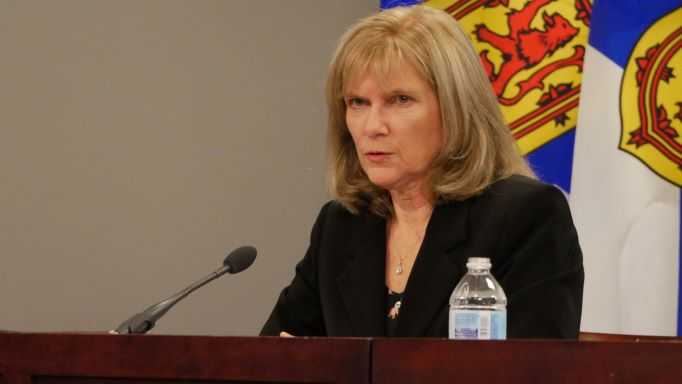Dalhousie hasn’t returned nearly $60 million in unspent COVID-19 relief funds
Province gave university $100 million to manage COVID relief before calculating costs

caption
Nova Scotia's auditor general, Kim Adair, speaks at a media briefing on Nov. 23.Nova Scotia’s quick response for pandemic relief has resulted in nearly $60 million going unspent and unreturned from Dalhousie University.
This comes from the newest report from Kim Adair, Nova Scotia’s auditor general. It focuses on the value for money of early COVID-19 relief programs, including the province’s decision to cede control of $100 million in business relief funds to Dalhousie.
On March 31, 2020, the province tasked Dal with administering financial relief programs for businesses and individuals adversely affected by the pandemic. The concern, according to the auditor general, is that control of provincial funds was given before the costs of programs had been worked out.
“The issue was signing off and giving $100 million upfront before they knew what was needed,” said Adair at a media briefing on Tuesday.
Currently, $41.4 million has been spent, leaving $23.9 million unspent and another $34.7 million set aside as loan guarantees for the tourism sector. This leaves $58.6 million of provincial funds in a university bank account.
The original agreement between the province and Dalhousie made it unclear how the leftover funds would be handled. This was amended after the audit began, now giving all remaining funds, currently about $58.6 million, to Research Nova Scotia, an independent, not-for-profit corporation that organizes the funding of research in the province.
This money isn’t going anywhere anytime soon. The contract doesn’t move the unspent funds until 2027.
“The concern we point out, though, is that until that time, these funds are sitting in Dalhousie University’s bank account rather than the provincial bank account. And it will remain there under the terms of the contract and not available for use for important provincial initiatives,” Adair said.
As the $58 million sits in a Dalhousie bank account, it is accruing interest, about $500,000 so far, which the province will also not get back.
“So our recommendations get into the fact that perhaps you should consider funding it as the funds are needed, rather than picking a dollar amount of 100 million and putting it in hands outside of government,” Adair said.
In a statement, Janet Bryson, a spokesperson for Dalhousie, said funds allocated to Research Nova Scotia will be used for public health research, “however, Dalhousie will take the Province’s guidance on the reallocation of all remaining funds.”
She said the university received no compensation for their services and received “minimal” fees of less than $40,000 to cover student and faculty wages.
$30 million for child care
The office of the auditor general also included audits of the province’s attempts at keeping child care businesses afloat after they were ordered to close on March 17, 2020.
Nova Scotia’s Department of Education and Early Childhood Development was given over $30 million for the first wave of emergency child care grants with the first ones sent out on March 19.
The audit noted a lack of “comprehensive monitoring,” with calculation errors made in determining payouts to daycares.
“Throughout the process, there were manual adjustments to individual grant calculations with no secondary review or spot checks performed. A manual system without review increases the risk of human error,” the report found.
Beyond that, the report found little documented fact-checking built into the grant approval process. For instance, child care centres were required to submit forms detailing their expenses, “however, there was no evidence requested to support that the information submitted by the childcare centre was accurate.”
The audit found that child care centres had no written guidance from the province outlining which expenses would be included in the grant calculation. This resulted in several underpayments and overpayments, including one with an “estimated overpayment of $132,000.”
The report noted that despite errors, 96 per cent of licensed child care centres had reopened by August 2020 and 89 per cent of family home child care providers were active by September 2020.
The report’s recommendations call on the province to “develop guidance on providing grants in emergency situations,” while the Department of Education and Early Childhood Development “perform audits to ensure the emergency childcare grants accurately went to entitled
recipients.”
About the author
Cam Towner
Cameron is a 4th-year journalism student from Innisfil, Ontario, and has lived in Halifax since 2017. He works as the Head of Broadcast for the...
